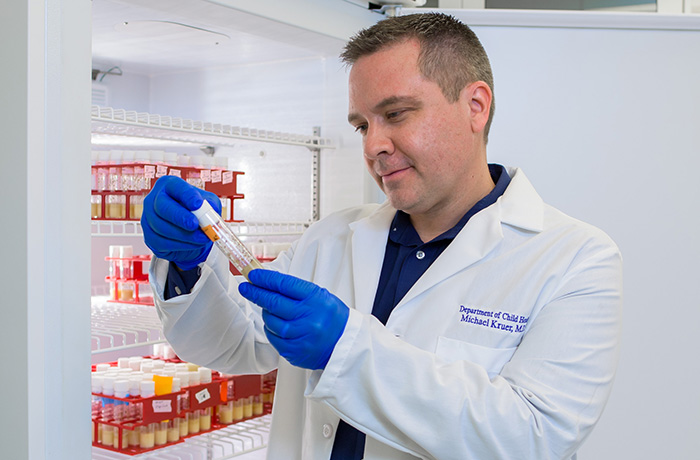
Faculty Spotlight: Michael Kruer, MD

Michael Kruer, MD, has always had a passion for helping children. He also had a desire to make an impact within the community, which is the main reason he wanted to get into medicine.
“I saw limitations in what we can offer to patients, and I wanted to develop better treatment options,” Kruer said.
Nearly ten years ago, Dr. Kruer was finishing his clinical rotations at the University of Arizona College of Medicine – Phoenix. He was just beginning his career as a neurogeneticist. Little did he know that he’d be back shortly after, but this time as an associate professor in the College’s Department of Child Health.
“It’s like a full circle,” Dr. Kruer said. “The College gives me fantastic resources, and I have great colleagues to do research with who are passionate about their work.”
Since a young age, Dr. Kruer has been fascinated with neuroscience, and he knew he wanted to do something in medicine and pediatrics. As a scientist and medical doctor, Dr. Kruer seeks to understand the basic mechanisms that lead to neurodegenerative and neurodevelopmental diseases in children, like cerebral palsy.
Dr. Kruer’s accomplished medical career started with an undergraduate degree in microbiology and psychology from Arizona State University and soon after, he graduated from the UA College of Medicine – Tucson in 2005.
His journey after graduation led him to residency at Phoenix Children’s Hospital and Maricopa Medical Center. Dr. Kruer was also granted a postdoctoral fellowship at the Translational Genomics Research Institute in Phoenix in 2005, and he completed postdoctoral training in pediatric neurology and molecular neurogenetics at Oregon Health Science University (OHSU) in 2011.
Dr. Kruer is currently the director of the Pediatric Movement Disorders Center and Neurogenetics Program at Barrow Neurological Institute at Phoenix Children’s Hospital.
When Dr. Kruer originally attended the College of Medicine - Phoenix, it only consisted of three buildings, and Downtown Phoenix had yet to develop. Since his return as a professor, he has witnessed the growth of the College, as well as the downtown landscape.
“The College has exploded,” Kruer said. “None of this was here when I finished medical school. However, cutting-edge science and high caliber faculty have remained a constant at UA, and it is a true pleasure to be back now as a faculty member.”
Dr. Kruer enjoys being back at the College and said that he is even colleagues with some of his old professors.
“It's really fun because I now get to call some of the same faculty who taught me as a student by their first names,” Kruer said.
Dr. Kruer continuously excels in his work, which is shown through the numerous honors he has earned, including the 2015 Most Recommend Physician by Sanford Children’s Specialty Clinic, the 2014 Doris Duke Charitable Foundation Clinical Scientist Development Award and the 2011 Shields Award by the Child Neurology Society.
Through his work and research with the College, he hopes to get a better understanding of what goes wrong with brain cells in children with movement disorders.
“In 10 years, I hope to be going strong in Phoenix with a thriving lab and challenging clinical practice,” Kruer said. “My role as a faculty member at the College will allow me to be at the center of biomedical innovation in Phoenix for years to come.”
About the College
Founded in 2007, the University of Arizona College of Medicine – Phoenix inspires and trains exemplary physicians, scientists and leaders to advance its core missions in education, research, clinical care and service to communities across Arizona. The college’s strength lies in our collaborations and partnerships with clinical affiliates, community organizations and industry sponsors. With our primary affiliate, Banner Health, we are recognized as the premier academic medical center in Phoenix. As an anchor institution of the Phoenix Bioscience Core, the college is home to signature research programs in neurosciences, cardiopulmonary diseases, immunology, informatics and metabolism. These focus areas uniquely position us to drive biomedical research and bolster economic development in the region.
As an urban institution with strong roots in rural and tribal health, the college has graduated more than 1,000 physicians and matriculates 130 students each year. Greater than 60% of matriculating students are from Arizona and many continue training at our GME sponsored residency programs, ultimately pursuing local academic and community-based opportunities. While our traditional four-year program continues to thrive, we will launch our recently approved accelerated three-year medical student curriculum with exclusive focus on primary care. This program is designed to further enhance workforce retention needs across Arizona.
The college has embarked on our strategic plan for 2025 to 2030. Learn more.